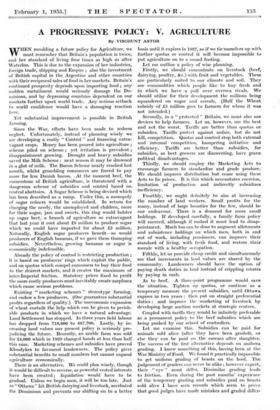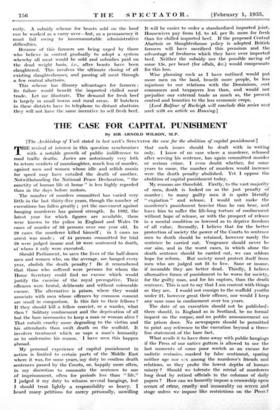A PROGRESSIVE POLICY : V. AGRICULTURE By VISCOUNT ASTOR W HEN,
moulding a future policy for Agriculture, we must remember that Britain's population is twice, and her standard of living four times as high as after Waterloo. This is due to the expansion of her industries, foreign trade, shipping and Empire ; also the investment of British capital in the Argentine and other countries with their reciprocal sales of food in her markets. Britain's continued prosperity depends upon importing food ; any sudden curtailment would seriously damage the Do- minions, and by depressing countries dependent on our markets further upset world trade. Any serious setback to world confidence would have a damaging reaction here.
Yet substantial improvement is possible in British farming.
Since the War, efforts have been made to redress neglect. Unfortunately, instead of planning wisely we are developing a costly " Control " and financing extra- vagant crops. Money has been poured into agriculture ; scheme piled on scheme ; yet irritation is prevalent ; disappointment growing. Drought and heavy subsidies saved 'the Milk Scheme : next season it may be drowned in a glut of milk. The Bacon Scheme nearly crashed last month, whilst grumbling consumers are forced to pay more for less Danish bacon. At the moment beef, the cornerstone of British agriculture, is threatened with a dangerous scheme of subsidies and control based on central abattoirs. A Sugar Scheme is being devised which has been described as a ramp. Under this, a monopoly of sugar refiners would be established. In return for charging the needy, the unemployed and children, more for their sugar, jam and sweets, this ring would bolster up sugar beet, a branch of agriculture so extravagant that last year it cost about £9 million to produce sugar which we could have imported for about £5 million. Naturally, English sugar producers benefit—so would producers of English bananas, if we gave them thumping subsidies. Nevertheless, growing bananas or sugar is economically indefensible.
Already the policy of control is restricting production ; it is based on producers' rings which exploit the public, and on quotas which compel consumers to buy their food in the dearest markets, and it creates the maximum of inter-Imperial friction. Statutory prices fixed to prOfit the more costly producers must inevitably create surpluses which cause serious problems.
Existing " marketing schemes " stereotype farming, and endow a few producers. (One guarantees substantial profits regardless of quality.) The uneconomic expansion of wheat curtails the help which can be given to perish- able products in which we have a natural advantage. Land Settlement has stopped. In three years field labour has dropped from 716,600 to 687,700. Lastly, by in- creasing land values our present policy is seriously pre- judicing the future. Recently, an arable farm was sold for £4,000 which in 1929 changed hands at less than half this sum. Marketing schemes and subsidies have proved Klondykes to favoured landowners. The policy gives substantial benefits to small numbers but cannot expand agriculture economically.
There is an alternative. We could plan wisely, though it would be difficult to reverse, as powerful vested interests have been created ; liquidation would have to be gradual. Unless we begin soon, it will be too late. Just as " Ottawa " hit British dairying and livestock, acerbated the Dominions and prevents our shifting on to a better basis until it expires in 1937, so if we tie 'ourselves up with further quotas or control it will become impossible to put agriculture on to a sound footing.
Let me outline a policy of wise planning.
Firstly, we should concentrate on livestock (beef, dairying, poultry, &c.) with fruit and vegetables. These are particularly suited to our climate and soil. They are commodities which people like to buy fresh and in which we have a pull over oversee rivals. We should utilize for their development the millions being squandered on sugar and cereals. (Half the Wheat Subsidy of 15 million goes to farmers for whom it was not intended.) Secondly, in a " protected " Britain, we must also use devices to help farmers. Let us, however, use the best and not the worst. Tariffs are better than quotas or subsidies. Tariffs protect against unfair, but do not kill, competition. Quotas and control stop both external and internal competition, hampering initiative and efficiency. Tariffs are better than subsidies, for subsidies, as beet growers are discovering, have grave political disadvantages.
Thirdly, we should employ the Marketing Acts to encourage farmers to standardize and grade produce.
We should improve distribution but cease using these Acts to fix prices. It is this which necessitates coercion, limitation of production and indirectly subsidizes inefficiency.
Fourthly, we ought definitely to aim at increasing the number of land workers. Small profits for the many, instead of large bounties for the few, should be our endeavour. There is a demand for more small holdings. If developed carefully, a family farm policy will succeed, although if rushed it must lead to disap- pointment. Much too can be done to augment allotments and subsistence holdings on which men, both in and out of work, including pensioners, can improve their standard, of living, with fresh food, and restore their morale with a healthy occupation.
Fifthly, let us provide cheap credit and simultaneously see that increments in land values are shared by the community. Landowners should have the option of paying death duties in land instead of crippling estates by paying in cash.
- As to beef. A three-point programme would save the situation. Tighten up quotas, or continue as a temporary measure the present subsidies, until Ottawa expires in two years : then put on straight preferential duties : and improve the marketing of livestock by developing large auction markets at strategic centres.
Coupled with tariffs they would be infinitely preferable as a permanent policy to the beef subsidies which are being pushed by our school of controllers.
Let me examine this. Subsidies can be paid for animals sold alive (after they have been graded), or else they can be paid on the carcass after slaughter. The success of the first alternative depends on uniform grading.- I know something of this, having been at the War Ministry of Food. We found it practically impossible to get uniform grading of beasts on the hoof. The judgement of graders can never be alike; however expert, their -" eye " must differ. Dissimilar grading leads to friction. Even during the past months' experience of the temporary grading and subsidies paid on beasts sold alive I have seen records which seem to prove that good judges have made mistakes and graded differ- ently. A subsidy scheme for beasts sold on the hoof can be worked as a carry over—but, as a permanency it must fail owing to insurmountable administrative difficulties.
Because of this farmers are being urged by those who believe in control gradually to adopt a system whereby all meat would be sold and subsidies paid on the dead weight basis, i.e., after beasts have been slaughtered. This involves the ultimate closing of all existing slaughterhouses, and passing all meat through a few central abattoirs.
This scheme has illusory advantages for farmers : its failure would benefit the Imported chilled meat trade. Let me illustrate. The demand for fresh beef is largely in small towns and rural areas. If butchers in these districts have to telephone to distant abattoirs they will not have the same incentive to sell fresh beef. It will be easier to order a standardized imported joint. Housewives pay from 14. to 4d. per lb. more for fresh than for chilled imported beef. If the proposed Central Abattoir or Slaughterhouse policy is adopted British farmers will have sacrificed this premium and the. advantage of freshness which they have over imported beef. Neither the subsidy nor the possible saving of some 15s. per beast (for offals, &c.) would compensate for this loss.
Wise planning such as I have outlined would put more men on the land, benefit more people, be less injurious to our relations with the Dominions, cost consumers and taxpayers less than, and would not prejudice our external trade as much as, the present control. and bounties to the less economic crops.
[Lord Balfour of Burleigh will conclude this series next week with an article on Housing.]















































 Previous page
Previous page